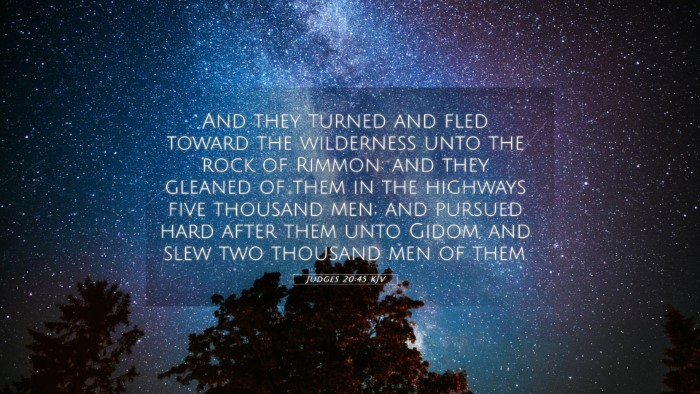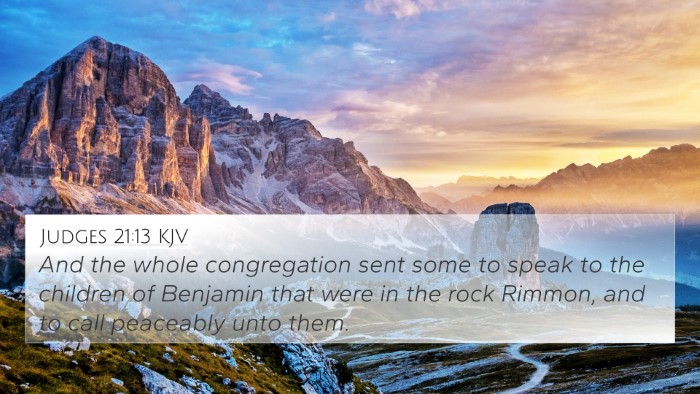Meaning and Interpretation of Judges 20:45
Judges 20:45 states:
“And they turned and fled toward the wilderness unto the rock of Rimmon: and they gleaned of them in the highways five thousand men; and pursued hard after them unto Gidom, and slew two thousand men of them.”
This passage describes a moment during the conflict between the tribe of Benjamin and the other tribes of Israel. The verse highlights the fierce pursuit of the fleeing Benjamites and their tragic loss. Here's a detailed summary of the verse’s meaning and connections derived from public domain commentaries.
Summary of Insights
The commentary interpretations provide a multifaceted understanding of Judges 20:45:
- Historical Context: Matthew Henry notes that this battle demonstrates the seriousness of Israel's division and the consequences of sin. The Benjamites, having committed a grievous offense, faced the wrath of the other tribes.
- Symbolism of Pursuit: Adam Clarke elaborates that the relentless pursuit represents divine justice, where those who stray from God's ways find themselves outmatched and ultimately defeated.
- Reflection of Israel's Unity: Albert Barnes highlights the unity of the ten tribes in this conflict and their collective action against Benjamin, illustrating the breaking away from familial ties when sin prevails.
Key Themes
Several significant themes arise from this passage:
- Divine Judgment: This event serves as a warning of God's judgment on sin and the consequences that follow.
- The Cost of Conflict: The verse also reflects the high price of civil strife, as many lives were lost.
- The Theme of Retribution: The actions taken by the tribes of Israel can be viewed through the lens of retribution—seeking to rectify wrongs committed, albeit with tragic consequences.
Cross-References
Understanding Judges 20:45 is enriched by cross-referencing with other scripture passages. Below are notable connections:
- Judges 20:1-3: This sets the stage for the conflict, providing insight into the grievances that led to the battle.
- 1 Samuel 15:33: This passage reflects similar themes of judgment and the consequences of disobedience.
- 1 Chronicles 8:1-7: A genealogical reference that highlights the importance of the tribe of Benjamin.
- Romans 6:23: This New Testament verse connects the idea of sin leading to death, paralleling the dire consequences faced by the Benjamites.
- Galatians 6:7: Here, the principle of reaping what one sows is evident, relating to the situations faced by both the Benjamites and Israel.
- Hebrews 10:30: This emphasizes God's judgment, relevant to the fate of the tribes at war.
- Matthew 26:31: Similar instances of fleeing from conflict can be paralleled here, as the disciples fled at Jesus’ arrest.
Thematic Connections
The thematic elements within Judges 20:45 can be connected to other Biblical texts that elucidate the nature of sin, justice, and the pursuit of righteousness:
- Trust in God: Proverbs 3:5-6 speaks of trusting the Lord in all circumstances, relevant to the need for divine aid in times of strife.
- The Fellowship of Believers: 1 Corinthians 1:10 emphasizes the unity of the church, contrasting the divisions seen among the tribes.
- Encouragement in Times of Battle: Ephesians 6:10-18 discusses the spiritual armor believers are to wear, relevant when facing life's battles.
Conclusion
Judges 20:45 serves as a potent reminder of the consequences of wrongdoing and the pursuit of justice in the face of sin. By engaging in cross-referencing and comparative Bible verse analysis, believers can deepen their understanding of how this passage interacts with broader Biblical themes.
Tools for Further Study
For those interested in exploring cross-references further, the following tools may be useful:
- Bible concordance
- Bible cross-reference guide
- Cross-reference Bible study methods
- Bible reference resources
- Comprehensive Bible cross-reference materials
In summary, Judges 20:45 is a significant verse that echoes through the Scriptures, inviting deeper exploration of its themes and connections to other Biblical narratives.






